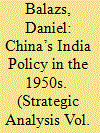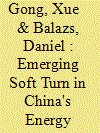| Srl | Item |
| 1 |
ID:
175883


|
|
|
|
|
| Summary/Abstract |
What led to the Sino-Indian militarized confrontations in 1959? I argue that Hindi-Chini Bhai-Bhai became a victim of changed perceptions in China. As long as China’s external and internal environment was relatively secure, India was seen as a potential ally, and Sino-Indian relations thrived. As external and internal pressures on China mounted, India’s behaviour vis-à-vis the Dalai Lama’s flight from China and the territorial dispute was perceived by China as reactionary. This change in perceptions prevented Beijing from adopting a conciliatory approach to India’s claims and eventually led to the 1962 border war.
|
|
|
|
|
|
|
|
|
|
|
|
|
|
|
|
| 2 |
ID:
183798


|
|
|
|
|
| Summary/Abstract |
Energy security has been the paramount concern of Chinese top leaders. Geographically, Southeast Asia holds the key to China's energy security, given its importance to Beijing's seaborne energy trade. Therefore, China's energy cooperation in the region is often analyzed from a hard security perspective. In a departure from these approaches, this paper explores the softer angle of China's effort of strengthening relations with its neighbors and assesses its impact. The soft approach puts a greater emphasis on public good provision such as sustainable development instead of the old method of enhancing energy security through resource trade. The aim of this turn was to bolster trust between China and Southeast Asia, strengthen the foundations of cooperation, and improve Beijing's image in the region. By providing a perspective different from hard security analysis, we shed light on the enabling and constraining factors of China's more active role in regional energy governance.
|
|
|
|
|
|
|
|
|
|
|
|
|
|
|
|